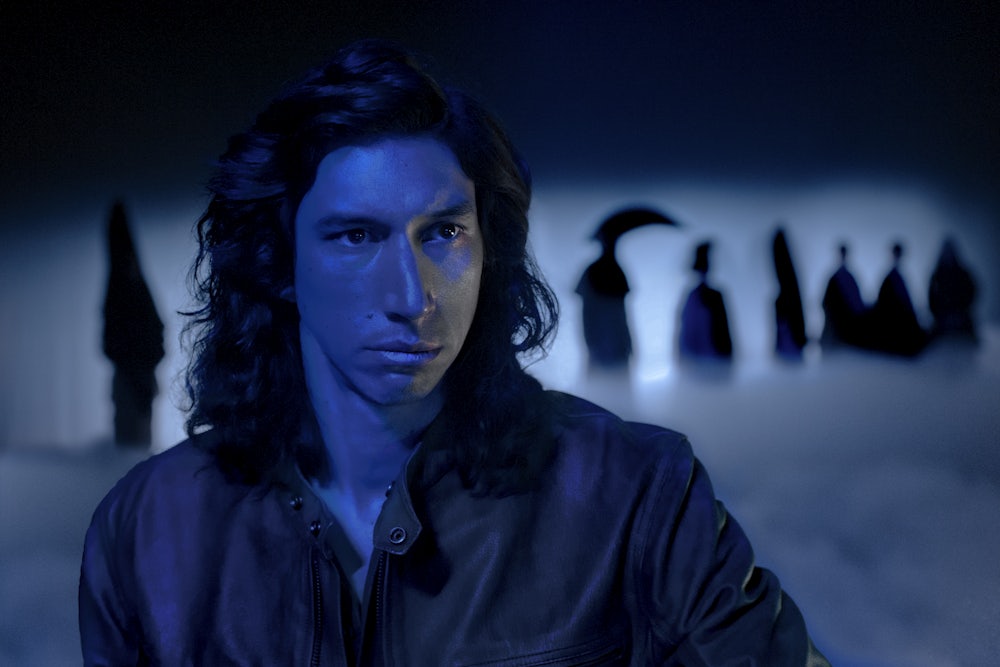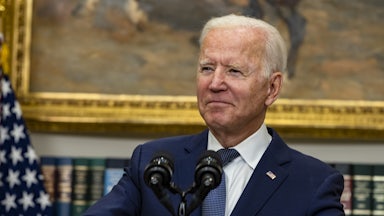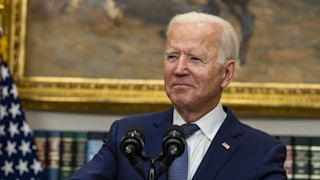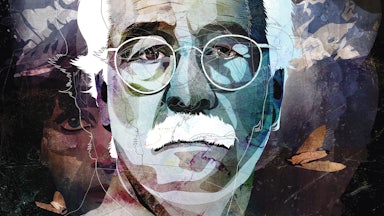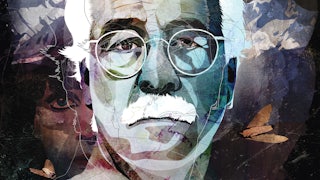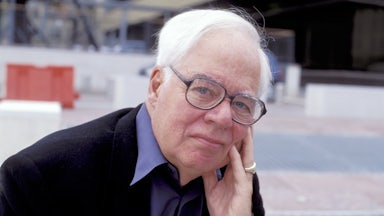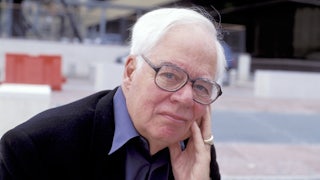In the HBO show Girls, there is a scene in which another character says, about Adam Driver’s gargantuan slacker, Adam Sackler, that he kind of looks like “the original man.” Like many of the best jokes, it holds up—Jessa, as played by Jemima Kirke, is right to say that Driver excels at suggesting an alluring version of the stooping figure who appears immediately before modern man in diagrams of evolutionary history, and she is extremely prescient in calling him “original,” since there may be no more original actor working in Hollywood at the present moment. In Annette, Leos Carax’s new and freaky operatic melodrama about sex and love and puppets, rage and motorcycles, and the fundamental incompatibility of art and parenthood, Driver is astonishing, his work somehow the closest thing to magic in a film that asks the viewer to suspend their disbelief in extraordinary ways. Playing a furious, “mildly offensive” comedian with the humorously stupid name Henry McHenry, Driver is tasked with singing, acting, doing stand-up, seeming drunk, and playing opposite an inanimate object that he must pretend is not only animate but the sole object of his love.
Quite often, because Annette is not what could be described as a sane or straightforward film, he is tasked with doing several of these things at the same time. That he succeeds makes watching him not just a pleasure, but a privilege, in the same way it is rare and moving to see an Olympic gymnast execute a perfect aerial cartwheel. Annette’s plot, or at least the beginning of it, is as follows: A bad-boy comedian, who is an international star, falls in love with the world-famous opera singer Ann Desfranoux (Marion Cotillard). Their romance captures the interest of the public, and the paparazzi hound them. (If you consider it too implausible that there might be an opera singer famous enough to be regularly featured on a major celebrity gossip blog, I humbly advise that it would be unwise for you to watch Annette, lest you experience an aneurism.) They get married, and Ann gives birth to a daughter, and that daughter is a highly unusual sort of infant. There is very little dialogue, most lines being sung instead: Annette was scripted, scored, and dreamt up by the brothers Mael, Russell, and Ron, of the band Sparks. Describing it as a “musical,” which suggests a kind of hit parade of memorable songs, is not entirely accurate, although the opening number, “May We Start,” which sees the cast introducing themselves and punning on “mais oui,” is exactly the kind of joyous glam-rock stomp that Sparks excel at.
The film’s numerous allusions to Henry’s physical undesirability—“Am I handsome? No!” he sings, in an amusing sequence in a sleazy nightclub. “Am I charming? Well, so-so!”—suggest a strange confusion about the explicit difference between sexiness and beauty, to say nothing of the ineffable nature of charisma. It is easy to imagine why a “shy” woman like Ann might be drawn to a sensuous brute like Driver’s Henry, whose appeal is inextricable from his terrifying power. It is funny, if a little heavy-handed, that Carax so often shows Ann with an apple minus one delicate bite, suggesting Eve in the immediate aftermath of gaining knowledge—a little original sin to go with her original Adam, as if both of them had different origins, one divine and one more typically Darwinian. (An even heavier-handed visual joke: Henry McHenry, whose physicality Driver based in part on nature documentary footage of gorillas, and whose stand-up show is called The Ape of God, snacks on bananas.) She admits to knowing something is not right within her marriage, but like many cinematic women married to dangerous, compelling men, she elects to trust her sex drive and her heart over her head. When the two sing a supposedly romantic ballad called “We Love Each Other So Much,” the titular line repeating until both of them sound thoroughly deranged rather than lovestruck, we see Ann and Henry walking hand in hand through a lush forest, her wide-eyed and him still somehow radiating sullen menace. Just before the song begins, Carax films Ann standing alone and Henry’s large hands creeping slowly into shot toward her shoulders, bent like claws, the mood suggestive of a Hammer horror movie rather the first blush of a sweet romance.
There is nowhere for this love story to go, we realize very early on, but straight to hell, making it only logical that the arrival of a baby in the second act spells doom rather than everlasting bliss. As Ann’s star begins to rise and Henry’s falls, owing in part to his misogynistic reputation and his tendency to make jokes about gas chambers onstage, he is left to raise their daughter, feeling thoroughly castrated as a result of being cast in what he perceives as a thankless, feminine role. When Henry improvises a sick routine onstage in which he pretends that he has killed his wife, Driver uses his immense size the way Buster Keaton used his diminutive stature, scale becoming part of both the suspense and the final punchline. The monologue is the confession of a thought crime, the admission of a desire so dark and so deeply rooted that the only way for Henry to articulate it is to play it off as humor—he became a comedian, he informs his eager fans, so that he could “tell the truth without being killed.” The contrast between the raging, macho Henry and his gentle, girlish wife is emphasized by the way they relate to their respective audiences, Henry qualifying success as having “killed them, murdered them” and Ann suggesting that her endless onstage deaths are a symbolic form of martyrdom. There is a message here, I think, about the relationship between sacrifice and earnestness, and the making of great art. We are led to believe Ann is a preternaturally gifted opera singer, whereas Henry, who despises everyone that he performs for, is accused of being a hack. Annette, though, is less concerned with elucidating a thesis than with giving us, as another musical once put it, “the old razzle-dazzle.”
It would be nice if the saintly, tender Ann, who supposedly gives her audience the most affecting and transcendent razzle-dazzle on the planet, was allowed to have at least a little ego, and it would be nicer still if Cotillard was given more to do than look ethereal, sing sweetly in her bright, crystalline voice, and wait for something bad to happen. Still, Annette is clearly Adam Driver’s film, built to house him as if he were an enormous, gleaming trophy, his sonorous, perfectly imperfect voice and dry, ironic wit helping to make even the most outlandish scenes plausible rather than preposterous. “Even if it feels surreal,” he said in an interview, “I can’t play surreal.” Carax is, rightly, as entranced by him as he was by Denis Lavant in 2012’s Holy Motors, both actors fluent in the language of the body. “When [Driver and Lavant] don’t move, they look like statues,” Carax said in a Q&A at Lincoln Film Center in early August. “When they move, they look like dancers.”
Gorgeous and unhinged, Annette proves to be a fittingly idiosyncratic showcase for an unlikely, idiosyncratic star. A onetime U.S. Marine from Indiana, born to a minister and a paralegal, Driver learned that he had been admitted to Juilliard while working at his day job in a Target distribution warehouse. He looks like no other man on earth, much less another man in Hollywood, and has an offbeat, syncopated way of speaking, clipped and somehow out of time; his line deliveries are so unusual they sometimes become memes. Interviews and profiles often note that Driver works in an obsessive, purist fashion—pitching up early for every class at Juilliard, lobbying for additional takes on set as if he were an overeager student asking for more homework—an impulse suggesting someone who has earned their place in the Hollywood firmament through talent and sheer nerve rather than through connections and entitlement.
If Leos Carax and the Mael brothers are suggesting that what makes great art is sacrifice and selflessness, then Adam Driver—a tireless laborer who is nevertheless too frightened by the idea of seeing himself onscreen to actually watch his films—is by their metric, as well as by many others, a great artist. “Do you consider yourself the hero of your own story?” Stephen Colbert asked him once, in a promotional interview for one or another of the newer Star Wars films. Although Driver was mostly kidding when he said, incredulously, “Me, in life? No-no-no-no, I feel like I’m barely hanging on,” it seemed clear that part of him was being honest. He is certainly no hero in Annette—he is, though, an extraordinary villain, a genius actor with an origin story that has more to do with work and evolution than it does an act of God.
